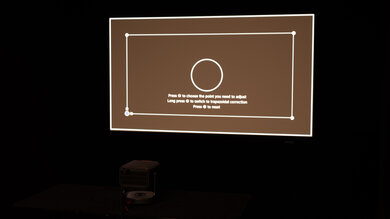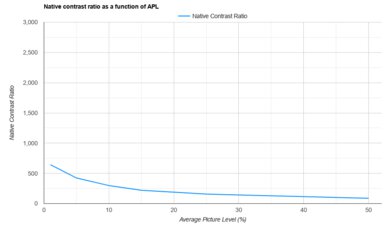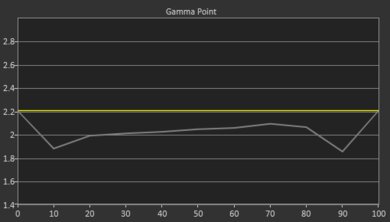The Samsung The Premiere LSP7T is a 4k HDR Ultra Short Throw (UST) projector. It's meant to be installed very close to the wall it's projecting to as it's capable of projecting on large surfaces from a very short distance: it projects a 90" image at a distance of 9.3" and up to 120" at 16.3". The projector has digital Keystone correction technology to help eliminate trapezoid effects if installed off-center or at an angle. The projector uses a laser light source with a lamp life of at least 20000 hours. It comes with Samsung's Tizen OS smart interface, is compatible with the Bixby and Amazon Alexa voice assistants, and is fully cast capable. Its three HDMI 2.0 ports are each capable of outputting 4k @ 60Hz, and it has Wi-Fi, Bluetooth, and an Auto Game Mode for gaming. Finally, it has a 30W 2.2ch speaker system.
Our Verdict
The Samsung LSP7T is alright for watching movies. Its native contrast is mediocre and its brightness is okay, so it's at its best in dim rooms or any room with subtle lighting. Unfortunately, the projector's color accuracy before calibration is sub-par but significantly improves with calibration. It has a wide color gamut, but it's just not bright enough to make them pop.
- UST capabilities allow the projector to be placed very close to the wall.
- Full suite of connectivity features like a smart OS, Bluetooth, and Wi-Fi.
- Very accurate after calibration.
- Sub-par color accuracy prior to calibration.
- Image quality is functional but unimpressive.
- Noticeably raised blacks in brighter scenes.
Changelog
- Updated Sep 30, 2024: Mentioned the newly reviewed Samsung The Premiere LPU7D in the Projector Technology section of this review.
- Updated May 21, 2024: Updated text throughout the review according to Test Bench 0.9, mainly in the Verdict, Compared To Other Projectors and Contrast sections.
- Updated May 21, 2024: We've converted this review to Test Bench 0.9. We've overhauled our Contrast tests, as we now measure contrast at various average pixel levels (APL). You can see the full changelog here.
- Updated Apr 03, 2024: Mentioned the newly reviewed Epson EpiqVision Ultra LS800 in the Brightness section of this review. We also added links to some of our recommendations in the Compared To Other Projectors section.
Check Price
Differences Between Sizes And Variants
We bought and tested the Samsung LSP7T. The projector has a higher-end model, The Samsung The Premiere LSP9T. The LSP9T has several notable advantages over the LSP7T, as it has a triple laser light source and is capable of projecting unto a bigger 130" surface. It can project at an even shorter distance than the LSP7T can, as low as 4.4" when projecting a 100" image, or 9.4" when projecting a 130" image. It also has a better speaker system than the cheaper model.
Our unit was manufactured in May 2022; you can see the label here.
Popular Projector Comparisons
The Samsung LSP7T doesn't offer good value for the money. Its best trait, its wide color gamut, can't fully be taken advantage of due to the projector's relatively low brightness. There are other options when it comes to Ultra Short Throw projectors: the Hisense PX1-PRO and Formovie THEATER are brighter and have better contrast for a similar price, while the Epson EpiqVision Ultra LS300, while limited to a 1080p resolution, is much brighter and has far superior pre-calibration accuracy for a far lower cost.
Check out our recommendations for the best short-throw projectors and the best projectors. If you'd prefer a cheaper unit, look up the best cheap projectors instead.
The Samsung The Freestyle 2nd Gen and the Samsung The Premiere LSP7T are very different products. The Freestyle 2nd Gen is a small portable projector with full auto keystone image correction and a tilting stand, letting you easily adjust the projection angle. The Premiere LSP7T is a huge ultra-short throw projector with no automatic image correction features, so it's not meant for you to move it around. The Premiere is also much brighter than The Freestyle, although The Freestyle is the more accurate product.
The Samsung The Premiere LPU7D has slightly better contrast than the Samsung The Premiere LSP7T, but otherwise, the LSP7T is the better product overall. The LSP7T is brighter, with a wider color gamut than the LPU7D. While both projectors are inaccurate out of the box, the LPU7D is even more so, and its colors are much harder to calibrate than they are on the LSP7T.
The Epson EpiqVision Ultra LS300 is better than the Samsung The Premiere LSP7T. The Epson is limited to 1080p, while the Samsung is a 4k projector with pixel shift. Still, the Epson makes up for it with a vastly brighter image, and is extremely accurate without needing to be calibrated. It's also more versatile as it can project on more screen sizes and at a shorter distance than the Samsung.
The Epson EpiqVision Ultra LS800 is much better than the Samsung LSP7T. They're both Ultra Short Throw projectors, but you can place the Epson closer to the screen or wall than the Samsung. The Epson is much brighter, with better contrast than the Samsung. The Epson is also much more accurate out-of-the-box, although the Samsung has more calibration options, so it looks better than the Epson after some tweaking. The Samsung also has a wider color gamut, but it's not bright enough to really make colors pop.

We've independently bought and tested over 70 projectors, and we've published all the detailed results for each so you can decide which one to buy. These have all been tested under the same standardized methodology, allowing you to compare them side by side. We still have all these projects in our lab so we can continually go back and compare them to ensure our reviews are still accurate. All our test methodology is also public on our website, so you can validate the results yourself.
Throw Calculator
Global Controls
Test Results


The projector isn't meant to be portable as it's big and heavy and lacks an integrated battery, so you need to plug it in. The projector lacks auto keystone correction, so you'll need to adjust the screen geometry manually, and it also doesn't have autofocus. It has an integrated 2.2 speaker system, so you won't need to worry about connecting it to a soundbar if you move it.

The Samsung SP LSP7TFAXZA uses a laser light source, which requires no maintenance and will last for 20,000 hours or more. This means you likely won't ever have to worry about replacing its light source. It's an Ultra Short Throw (UST) projector, capable of projecting an image on a 90" screen at a distance of 9.7" up to a 120" screen at a distance of 16.3". The projector doesn't do true 4k as it uses pixel shifting to create a higher resolution image. This offers better quality than 1080p but doesn't look as good as native 4k.

This projector has okay brightness and decent brightness uniformity. It's capable enough for a dark room, but it looks washed out when a few lights are on. Unfortunately, the projector isn't bright enough to make its colors pop even with its wide color gamut. For a much brighter Ultra Short Throw (UST) projector, check out the Epson EpiqVision Ultra LS800 instead.

The Samsung LSP7T's contrast is mediocre. Its blacks look fine in a dark room, but they aren't deep or inky, and they're especially raised in brighter scenes. This projector's successor, the Samsung The Premiere LPU7D, has slightly better contrast.



The projector has inadequate color accuracy out of the box. Its white balance is completely off, with all primary colors being overrepresented in shades of gray. The projector's too bright in all scenes. Its color accuracy is sub-par, especially so when it comes to cyans as they veer towards green. Thankfully, the color temperature is fantastic.



The projector has full color calibration and 10-point white balance calibration, and it's vastly more accurate after adjusting these settings. Sadly, cyans are still green-ish, but other colors are much more accurate. After calibration, the projector's white balance and color temperature are nearly perfect, and its gamma is almost exactly on target.


The Samsung LSP7T has a very wide color gamut. It covers nearly the entirety of the Rec. 709 color space used with SDR content, and it does an okay job with the wider Rec. 2020 color space.
The Samsung The Premiere LSP7T has Samsung's popular Tizen smart OS with full casting support, so you can share your phone or laptop screen directly to the projector. Overall, the interface is very smooth and has a ton of apps. The projector has a 30W 2.2 speaker system with a subwoofer.


